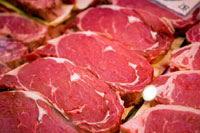
Should You Eat Beef?
Well, that really depends on your genes. Some of us were meant to eat beef, because our ancestors evolved eating the flesh of animals. Those of us whose DNA traces back to early hunter-gatherers need beef to be healthy.
The people in this category are for the most part blood type O and B. Type A and AB developed later in the evolutionary tree around the time that farming was invented, and so they thrive on more of a plant based diet. These people can be successful vegetarians.
This is covered in detail in Dr. D’Adamo’s blood type diet books. They are a good reference for understanding why we as individuals differ so much in our nutritional needs. Thus red meat is necessary for some of us, and best avoided by others.
What About the Health Risks?
I know you have heard all about the dangers of eating red meat due to saturated fats. You have also been told that it increases the risk of cancer and heart disease as well. Sounds like you should avoid eating beef, however it’s not quite that simple.
There is beef and then there is grass fed beef! When cows are raised on grain, they develop lots of fat, just like a human who consumes too much grain based carbohydrates. When cows are grazed on grass, their meat is nice and lean, containing far less fat.
There is also the issue of synthetic estrogens, and antibiotics that are fed to cattle. When cows are raised organically, they don’t get synthetic hormones to fatten them, and they are not given commercial antibiotics as well.
One alternative you might want to consider is Buffalo, because they are grazed on grass and their meat tends to be a lot leaner than cattle. You can get buffalo in an increasing number of restaurants as well. It’s a bit less tender than beef, but is lower in saturated fats.
These three things, grain based feed, synthetic estrogens, and antibiotics are what make it a health risk. Cows were not raised that way years ago, and it is modern agricultural methods that have resulted in our commercial beef being a health risk.
There is new information that suggests that heavy consumption of beef could cause a problem for people unable to adequately “methylate” the amino acid cysteine to methionine. This can cause high homocysteiene levels which are an increased risk factor for heart disease, cancer, and Alzheimer’s Disease.
Eat Beef AND Be Healthy
To get around the problems associated with commercially raised beef, and the saturated fats it contains, there are a few things you should keep in mind.
- Try to purchase and eat grass fed beef
- Make sure the beef is certified as organically raised
- Try to get the leanest cuts of beef you can buy
- Trim off the extra fat before cooking and eating
- Do not over cook beef, rare to medium rare is best
Overcooking causes problems from toxic substances that can build up due to high heat. Some cooking is necessary to guard against possible bacteria in red meat, but it should cooked as little as possible and still be safe to eat.
Cooking at high temperatures or for too long also destroys important B-vitamins that are essential to your health. Overcooked beef can lead to high homocysteine levels, so once again, eat beef as rare as possible, and you will get much more nutrition from it.
Remember that if you have type O or B blood, some consumption of red meat is important for optimal health. If you follow the above guidelines and consume it in moderation, it should be health promoting rather than a health risk.
Raw Food Benefits for Antiaging




